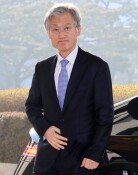Gov’t insists tenant-protection law works out
Gov’t insists tenant-protection law works out
Posted August. 04, 2021 07:20,
Updated August. 04, 2021 07:20
Since a revised bill on the tenancy law aimed at protecting tenants passed the National Assembly last July, prices of jeonse, a deposit-based lease system in South Korea, have risen by 32 percent, according to a joint study by T Dong-A Ilbo and real estate big data firm Asil of 60,000 house units that have been transacted on jeonse over the past one year in Seoul. If you rent a house on jeonse, you should pay a higher price than before. Otherwise, you have to put a larger amount of deposit on the house for the renewal of the jeonse contract two years later. The South Korean government argues that tenants enjoy the perks of the revised tenancy law. However, the reality is that most of them have no option but to shoulder the burden of a larger deposit money immediately or two years later.
Over the past one year with the renewed tenancy law in action, the average of new jeonse contracts has cost tenants 568 million and 750,000 won. Renewed contracts have cost them an average of 431 million and 370,000 won over the same period, meaning that they will have to give more than 140 million won additionally to the landlord two years later even if market prices of jeonse remain unchanged during the contract period. The increase rate of new jeonse contracts hovered below an annualized rate of four percent from 2018 to 2019 but over the recent one year, it has recorded more than 30 percent. The revised tenancy law is considered to be the biggest contributor to the recent spikes in jeonse prices.
The government says that 77 percent of jeonse contracts have been renewed in Seoul, meaning that eight out of 10 tenants continue the existing contact by agreeing on an increase of jeonse deposit by five percent or lower. However, the renewal rate turns out to be 59 percent according to the study led by The Dong-A Ilbo of all of 3,941 apartment complexes where jeonse contracts were entered into. The government only studied 100 apartment complexes. What’s worse, it did not specify them exactly, raising doubt that the government is determined to look at the status quo squarely.
There has been a huge gap between the government-led statistics and the realities. The housing market is filled with concerns that jeonse will get scarcer over the latter half of the year due to a decreasing number of those moving in apartment units whereas the government argues that there are enough houses available on the market by even including leases of detached houses and multi-household houses. The Korea Appraisal Board, an agency in charge of providing governmental statistics, announced that prices of Seoul-located apartment units increased by 14.9 percent from the current administration’s inauguration to the first half of the year. However, private-sector organizations say that the increase rate of prices of apartment units in Seoul is up to 80 percent over the period in question – 51.3 percent by KB Kookmin Bank, for example.
A man in his 40s lamented in an online petition on South Korean presidential office Cheong Wa Dae’s website that there is no way to afford a skyrocketed jeonse deposit other than stealing money. Nevertheless, the government repeatedly says that the tenancy law helps make the housing market stable for the working-class. If the government fails to notice how the public views its measures, not any policy earns pubic trust. It mentioned “the shock due to housing supply” when it published a set of housing policy on Feb. 4. In a recent public discussion on the real estate market, it talked of “an enormous amount of house supplies.” If so, why would housing prices only go up constantly? Given that the government compliments itself and announces policies without any sense of reality, it may be only natural that the market goes into the opposite direction.





![[천광암 칼럼]장동혁은 대체 왜 이럴까](https://dimg.donga.com/c/138/175/90/1/wps/NEWS/IMAGE/2026/02/22/133399127.1.jpg)

